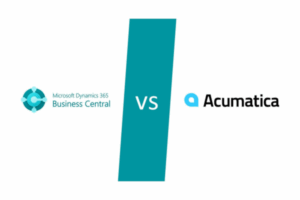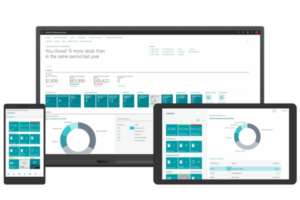1. Project Costs Keep Sneaking Up
Picture this: you’re sitting down to review the budget on a new office building project. You think you have a good handle on costs, then bam, the invoice for lumber is twice what you expected. Next thing you know, you realize you’re paying extra for overtime and you didn’t even see it coming.
In many construction businesses, it’s easy for spending to slip through the cracks when your books are scattered across different programs. Maybe you track hours in one system, material costs in another, and keep job details in a bunch of spreadsheets. When that happens, you don’t see the red flags until it’s too late.
An ERP solution acts like a real-time scoreboard. Instead of waiting until the end of the month (or even the end of a project) to see you’ve gone over budget, an ERP can show you daily spending and resource use. One study from McKinsey found that large construction projects often take 20% longer than expected and run up to 80% over budget. Small and mid-sized projects might not be off by that much, but you get the idea: construction costs are famous for sneaking up on you. A good ERP helps you spot these surprises before they become disasters.
2. Communication Feels Like a Game of Telephone
Have you ever played that game where one person whispers a phrase to another, who whispers it to another, and by the end it sounds completely different? That can happen in construction, too. Maybe the project manager tells the site supervisor something about a new client request, but the word doesn’t get around to the foreman. Then your finance team never hears about the change orders, and everybody’s left scratching their heads.
An ERP system acts like a single source of truth. Instead of information jumping between team members through emails, texts, and phone calls, the ERP keeps important details in one place. No more missing messages or lost instructions. Sure, you can still call Bob on the job site if you really need to, but at least your main details are all there in one neat and tidy place. Here at Alchemy 365, we’ve seen a lot of companies breathe a sigh of relief once they no longer have to hunt through text threads just to confirm a change order.
3. You’re Drowning in Too Many Apps
Maybe you’re using one software for time tracking, another for project management, another for accounting, and yet another for scheduling. It’s a bit like having four different remote controls for your TV, DVD player, streaming box, and sound system. If you keep them all lined up perfectly, you can make it work. But if one of them goes missing (or loses batteries), everything grinds to a halt.
An ERP is like one universal remote that can handle all of those different functions. It reduces your chaos by pulling together financials, job scheduling, payroll, inventory, and more. You’ll still have some specialized apps for certain tasks, but an ERP can be the central hub where all that data is stored and shared. That helps you avoid double-entry errors and puts a stop to logging into ten different apps just to check one project status.
4. Your Reporting and Forecasting Are Always Late (or Dead Wrong)
If your finance team constantly says, “Sorry, we need a little more time to finish the report,” that’s a sign you might need an ERP. Relying on spreadsheets that pass from one department to another almost guarantees that someone’s going to enter numbers in the wrong spot. Or maybe they’ll forget to share an important update about material cost changes.
When you have an ERP, your data updates in real time. That means your CFO, CEO, and owners can see the same numbers at the same moment. And if everyone’s pulling from the same place, it’s a lot easier to spot problems before they become full-blown emergencies. According to Deloitte’s research, businesses that use integrated systems tend to make better decisions faster because they don’t have to wait around for info to trickle in. That’s a big deal when every day counts in construction.
5. Missed Deadlines and Scheduling Confusion
Imagine a scenario (hypothetical, of course) where your foreman shows up at a job site ready to pour concrete, only to realize the rebar never arrived. The blame game starts: was it Purchasing’s fault? Did the order get messed up in Shipping? Or maybe it was Accounting that didn’t approve the funds in time. Meanwhile, your schedule is thrown off, and you might have to push back the entire project timeline.
An ERP system helps you keep track of who needs what and when they need it, all in one central calendar or planning tool. If the schedule changes, the system updates so everyone can see it. That doesn’t mean you’ll never face unexpected delays (in construction, that’s just part of life), but you’ll be more prepared for them.
6. You Struggle to Grow and Take On Bigger Projects
A lot of businesses reach a tipping point. They start out small and get by with basic tools. But as they take on bigger jobs or expand into more locations, those old tools can’t keep up. You might find that you can’t easily handle new types of projects or you’re constantly telling your staff, “Hold on, we need to figure out how to track this.”
An ERP gives you the foundation you need to grow. You can bring new teams and departments on board without a ton of extra hassle. We’ve spoken with construction CEOs who said that after rolling out an ERP, they felt more confident about taking on more complex projects. They had a system in place that could handle extra workload without everything falling apart.
7. Your Team Spends More Time Doing Busywork Than Building
Nobody gets into construction to sit at a desk all day, typing numbers into spreadsheets or toggling between apps. You got into this field because you like building things and watching projects come to life. When half your staff (or more) is tied up in administrative tasks, it might be time to find a better way.
An ERP automates a bunch of daily tasks. It can pull time-sheet data straight from the field, generate invoices automatically, and link up with your accounting software. This means your people can spend more time doing the work that really matters, whether that’s overseeing a build, talking with clients, or designing new projects.
The Bottom Line: How an ERP Could Help
You might notice a running theme: information gets messy when you don’t have a single place to store it, and it’s a headache to keep track of multiple systems. An ERP creates one place where everyone can see the same data and update it in real time. That helps you plan better, spend smarter, and keep your team on schedule.
Here at Alchemy 365, we’ve seen how construction companies feel when they finally clear away the clutter of random software solutions. It’s a sense of relief, like cleaning out a garage that’s been piling up junk for years. No one wants to trip over old boxes every time they walk in, right?
A Quick Example
Let’s pretend we have a fictional company called “Sunrise Builders.” They start small, and everything’s going okay with a handful of spreadsheets. As they grow, Sunrise Builders picks up more jobs and hires more people. Before they know it, they’ve got four different software tools: one for scheduling, one for payroll, one for materials tracking, and another for client invoices.
All these tools can work on their own, but when Sunrise Builders tries to see how each project is performing in real time, they have to dig through all four. This leads to delays, guesswork, and no small amount of frustration. Sunrise Builders finally decides to adopt an ERP. Suddenly, they notice fewer missed purchase orders because the system sends automatic alerts. Their project managers talk the same language because they share the same dashboard. Within a few months, they’ve saved enough money to reinvest in new equipment, and morale goes way up.
That example is made-up, but it’s the kind of story we see play out often. It’s not always dramatic, but it can be a game-changer for a construction business looking to streamline.
Should You Make the Switch?
If any of those seven signs ring a bell, then it might be time to look into a construction ERP solution. We’re not here to twist your arm. At Alchemy 365, we believe in giving honest advice because we know how complicated this process can be. Your company might not be ready for an ERP this very second. But if you’re seeing cost overruns, messed-up communication, and project delays more often than you’d like, it’s worth taking a step back and asking if your current tools are really serving you.
The good news is that getting an ERP doesn’t have to be terrifying. With the right partner, you can figure out which features you need right now and which ones you can add later. And since technology keeps evolving, you’ll want a system that’s flexible enough to grow with you.





